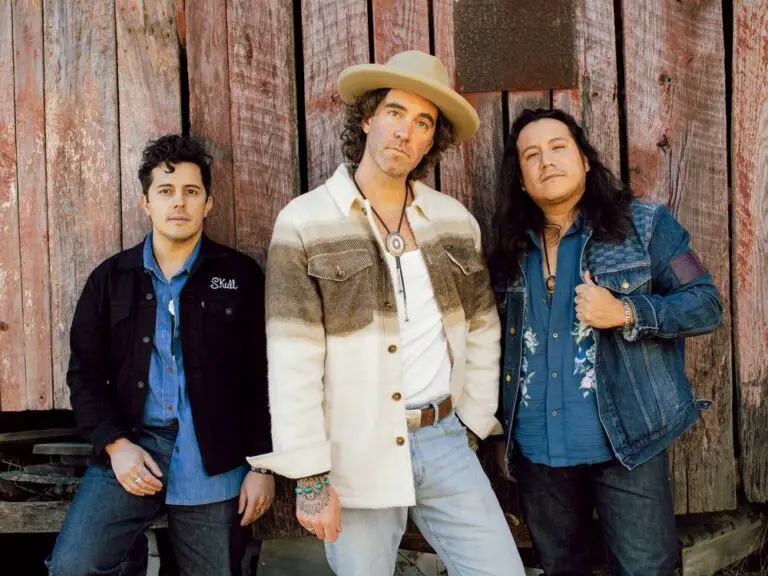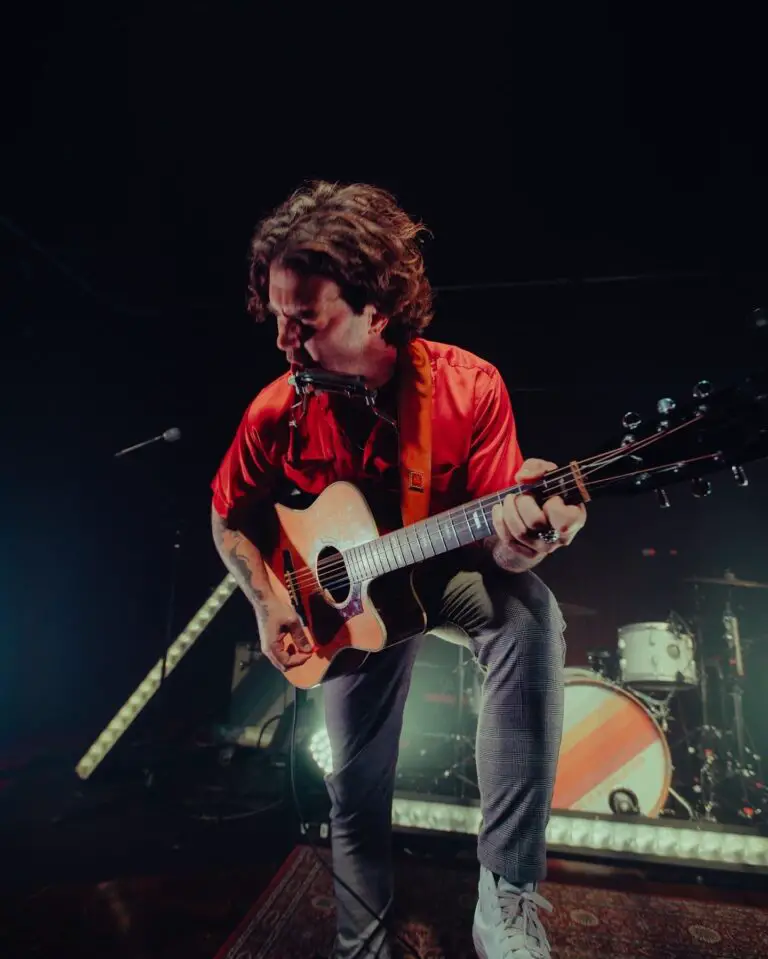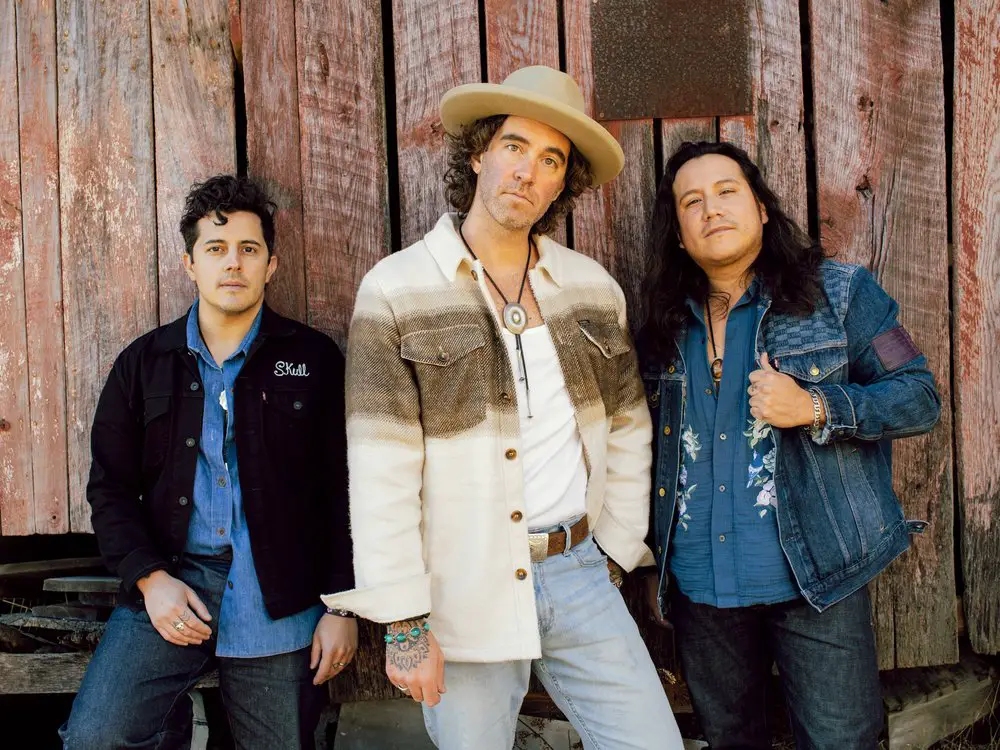As the Sound Mind Live Benefit concert approaches on May 18th at the Brooklyn Paramount, we continue a series of interviews with artists taking the stage at this powerful, purpose-driven event. Following a recent conversation with MILCK, NYS Music is thrilled to speak with Zac Barnett, frontman of the alt-rock band American Authors.
Known for their infectious anthems like “Best Day of My Life” and their uplifting, introspective songwriting, American Authors bring an energy and message that aligns perfectly with Sound Mind Live’s mission to elevate mental health awareness through the power of music. In this interview, Zac opens up about the band’s journey, the meaning behind their music, and why this cause hits close to home.

Pat: Hey Zach, how are you doing today, man? How are you?
Zac: I’m doing well, thanks.
Pat: I heard you were in the studio last week, huh?
Zac: I was, yeah.
Pat: How was that going?
Zac: Great, we finished album six.
Pat: Oh, nice. What’s the news with that?
Zac: We just dropped a single from it last week, so we’ll do a new song from it every three to four weeks till all ten songs are out.
Pat: Yeah, I heard something about that. That’s an exciting new approach.
Zac: Yeah. Yeah, it’s been fun. It’s kind of like It was cool because we had this whole album kind of like ready to go and you know, we were having a conversation about how to release it. Our manager Alex was like, you know, I feel like if we’re gonna do the next release, I really want something that’s more exciting that I can kind of pitch as like a single and whatnot. And I said, well, do you think we have anything like that? And he said, “Tumble Down,” which, before we were like, I don’t know, it sounds kind of different. It’s, you know, it’s pretty out there for us and a different sound from what we’ve usually done. And you know, he was kind of like I don’t think it matters. I think it’s a really special song. It’s really exciting, and I say we just go for it.
Pat: Wow. Very cool. You know, the whole landscape of the music industry has changed so much, ever since streaming. It’s kind of fun when artists have a new approach on releasing material to their fans.
Zac: Yeah, I mean It’s cool for us because, you know, we write and record everything ourselves. It’s really exciting to kind of do this in another direction. It’s kind of like, cool, we have these two songs that fit in this lane. Let’s really do an entire album based around this sound, and it’s easy enough for us to go in, you know, work remotely, go in for a week and basically bang out an entire album.
Pat: No, that’s fantastic and you guys are set to play the Sound Mind Live event this month, right. What is it that inspired you and the band to get involved with this event?
Zac: Well, we love Sound Mind. We’ve done a lot of work with them before in the past, not only being a part of different events with Sound Mind, but for me personally, I’ve worked with Sound Mind to help me find therapists and to help me with mental health needs that I’ve needed. So I think overall it’s a great organization. We want to be able to help and give back and kind of be a part of it however we can, you know.

Pat: That’s amazing Zac. The idea of Sound Mind is connecting music and mental health and it’s such a powerful thing. How does that whole mission speak to you and American Authors as a collective / band?
Zac: I think it can be quite daunting, you know, tackling your own mental health, and for me, I’ve felt really lost on where to start. Where it’s like if I’ve made the decision that I need help dealing with my own personal mental health, it’s like, okay, well, where do I go next?
Pat: How do I start, right? What should I do?
Zac: Yeah, so the first thing that I’m looking to do is find myself a therapist. Like, it feels very uncomfortable going on Yelp for therapists and then to book myself with someone who has like a four and a half star rating. I don’t know, it just feels bizarre.
I know for me personally, it’s so much more beneficial to to have an organization out there that I can connect with first, and then they can put me in touch with different people that they know have helped other artists, who have worked with other people that that might be in a similar field of work as me and you know, for me that’s been really really helpful.
Pat: Sure.
Zac: As a whole, as far as American Authors goes, just with the topic of mental health, it’s like, you know, the big theme that we’ve always kept in our music over the years is the idea of hope. No matter what you’re going through, it’s really that theme of finding light at the end of the tunnel and being hopeful for brighter times and better days.
Pat: Definitely and can hear that in the music and there’s also a question about that, we’re gonna get to that ties in there, but as you said mental health is daunting.
Everybody suffers from it at some point or another and in some capacity. Everyone suffers differently and mental health isn’t something that is one size fits all.
I’ve always kind of joked, it’s like you can’t trust anybody that doesn’t have scars because we’ve all got them. What separates times now from then is that we as people don’t have to speak in silence about these things anymore. As these conversations are starting to be had more openly.
Zac: They are!
Pat: As you just touched on, a lot of your music does carry that message of hope and resilience. Is it safe to say that was intentional from the beginning?
Zac: It’s kind of just always been an underlying theme for us, you know, with Believer and
Best Day, being our first songs to really take off as American Authors. I think what a lot of people don’t usually get on first listen from those songs is they’re very open and honest in the verses about struggles that you’re going through. So there is the juxtaposition about we all struggle, we’re all dealing with our own insecurities, but when the chorus hits, it’s the twist on it. It’s the idea that I will be a believer that things will get better. Or it’s like the song doesn’t say this is the best day in my life or it was the best day in my life. It’s saying this is going to be the best day in my life. You know, it’s saying that that day hasn’t happened yet. That’s your choice, and it’s what you wake up and what you choose in your own personal life of how you approach it and how are you going to create your own best day.
Pat: Yeah, yeah, absolutely. I mean, there’s a lot to be said or to put stock into about that.
Zac: Yeah and that’s huge for us and It’s always been a big theme in our music. We’ve never been afraid to hide from, you know, discussing our personal struggles and what we go through as individuals. But hopefully it’s with the overall message of look, we get to choose how we want to do things, and we get to choose how we’re gonna go through life every single day.
Pat: Yeah, because sometimes we have to allow ourselves space to get out of our own way right? Allow ourselves the opportunity to give ourselves the permission to say, I’m going to have a good day.
How do you keep those things in check? I understand that’s where organizations like Sound Mind really come into play, right?
Zac: It’s like that’s why I’m thankful that there are great organizations like Sound Mind who are there to be resources to help you figure that out. To help and to be there for you, to help you kind of address whatever that is and get you to the point where you are able to wake up and function and have a best day.
Pat: Are there any songs in your guys’ catalog that have taken on a new meaning personally, as perhaps you take a look at them through the lens of mental health?
Zac: Yeah, I mean, there’s so many songs, especially off of our first album that hold so much more weight as time goes by, you know. There’s songs like Luck, which the more you experience with your own family and different changes throughout family ties, like that song has a whole new meaning in my life or You could look at our song Deep Water. You know, as you go through love and loss, it’s really the idea of for me, that song kind of started as primarily a family song, you know. Deep Water was a song written for a family member whom we had lost.
For me personally, it’s kind of morphed more so into a song about friendship and my crew and especially about my bandmates. It’s kind of being there for the people around us and also how many. I don’t know where I would be these days without my bandmates in American Authors always being there to support me and lift me up in tough times, so that’s a really great one that’s ever evolving.
Pat: With fans, I’m sure there’ve been so many moments where they’ve shared self discoveries and or situations that they’ve been in where your music helped them through a struggle, right?
What’s that feel like as an artist? Is there ever a pressure of sorts that you feel with interactions like that, as it’s so deep and personal?
Zac: I think it’s a beautiful thing. I think, you know, it’s so incredible to have a song that’s so personal to myself individually that can resonate with another human being in a totally different way sometimes and to hear them be able to open up and share their stories.
Pat: Do you ever witness their sigh of relief when they unpack a personal tragedy into triumph to you? What do you feel when you hear a story like that?

Zac: Uh, yeah, I think it’s really beautiful and it’s the truest gift of art for me. I’m thankful that my art can be a part of that and I get to experience that.
Pat: It’s gotta be an amazing feeling because essentially you’re saying to them, let me hold these burdens with you. I am here for you. Even though you’re saying these things through songs and speakers.
Zac: Totally! We try to be as available as we can on social media, and we try to respond to DMs and you know, when people reach out to us with those stories, we’re you know, always try to actively be there and provide words of comfort. I guess maybe it’s just more so the idea of hoping that they know that we hear them, we are getting their messages and so I think having bravery to even open up and share those experiences with the artist is really cool. I hope our fans know that we appreciate that. That’s amazing, man.
Pat: The music industry, is it a pressure cooker?
I would think so, right? What have you learned about your own mental health and managing it throughout the years?
Zac: Um, I think you’ve gotta carve out time for yourself. Um I think that’s super important, no matter how that is, you know. Find time for yourself. For me, find time for your family, find time for your friends. Don’t get lost, and don’t forget about the people who were there with you on day one. Don’t take that for granted. I know for me, I really like to go out on long runs, and when I go, I don’t listen to music.
I have no podcasts, no music or headphones and uh that’s kind of my time to to to think and to really just let my thoughts run wild, and that’s something that’s really helpful for me.
I think the big thing, too, is look, it’s like the music industry was never meant to be easy. It was never meant to be an easy career path. It was never meant to be easy on a person’s mental health, and I think it’s like it’s important to know that when you go into it, right? It’s like you’re not gonna choose to be a UFC fighter not expecting to get knocked out at any given time. I think we need to be realistic with what these things are and the expectations and everything. It’s like if there are certain things that you want, I think speak up with it. Don’t be afraid to say it.
Pat: You just laid out a perfect example there. It’s kind of becoming more common place for artists to speak about mental health.
Was there a specific turning point you can remember where you decided it was important just to leverage your platform and be open about mental health and speak out about those kinds of things to assist it getting into the light?
Zac: I mean, I’ve always been a pretty open book, but with that being said, I’ve never been someone who’s struggled with mental health. I’ve never, you know, I’m 38 years old, and I’ll be completely honest, like that’s not something I was raised on.
Pat: Sure.
Zac: I hadn’t even heard that word until I probably already dropped out of college. I come from like the last of that time period and was like, I don’t know, especially for like dudes, just really wasn’t something that was super common in my life.
Pat: Right, right, right.
Zac: With that being said, I try to learn more about it every day. I try to be supportive of people who really are going through it. I also try to be aware. Hey, I’m not afraid to go talk with a therapist. I’m not afraid to see multiple therapists for my relationship. I’m not afraid to go see a couples counselor.
It’s like I think those are tools and resources just like everyone needs them for and like there are so many tools for so many other things.
I heard someone say one time and it’s like if you break your leg or whatever it is, it’s like you go through physical therapy to get your leg back working, right? Right.
Don’t break your leg and do nothing and let it heal on its own or whatever it is. It’s like, no, you go see someone for months and months and months and you work every day at it to get your leg better or whatever.
So it’s like you need to look at you need to look at these doctors and professionals and therapists and all that stuff. It’s like you’re not gonna you’re not mentally gonna get healthier or better or stronger or whatever it is if you’re not meeting with professionals and working on it as much as you can. Obviously it’s a hard thing for people because it’s a lot easier to go to a doctor for a broken leg and heal that. At least, you know, you’ll have a cast, you’ll have a cool story.

Pat: Mental health is a little bit different. There’s that stigma, there’s those feelings of shame. To have to deal with that and the inner turmoil, it’s a lot. Taking the initiative in that first step is a great thing.
Zac: I agree that taking that first step is a big step and I give kudos to people who do that.
As far as what I can personally say, again, as a 38-year-old man, who didn’t grow up even knowing much about this stuff, it’s like for me at this point I don’t think there should be that boundary. I think we should be okay talking about it. I think it should be normalized.
I think there are plenty of resources out there, like Sound Mind and a bunch of others that are there to help you no matter what your financial background is, no matter what.
I have friends who have been sent to rehab for free through different mental health organizations, because they financially could not pay for it and they were struggling so badly that the organizations found the grants to send them to rehab and such.
I think these days we don’t need to be afraid to talk about that, and I think the more we can be open about it, the more you can help.
Pat: Keeping on mental health, music and the way it connects with people, I remember during the pandemic and I’m a huge Pearl Jam fan. I remember in the pandemic their new album “Gigaton” came out and it kind of became my emotional support record, so to speak. What are you emotionally connecting to, album wise when you’re having one of those days?
Zac: The new Stephen Wilson Junior, “Son of Dad” album for me. That’s been on repeat. I’ve played it at least once a day for the last six months.
It’s really incredible and I think when you’re looking at an artist like Steven Wilson Jr. and you’re looking at their lyrics, when he’s a guy who grew up in Kentucky or Indiana with a boxing background. Then you listen to how vulnerable and open he can be with his lyrics and the way that he’s phrasing things in ways that I personally never heard before. It’s just Nice.
Pat: Lyrics really can help you navigate so many different things that you’re going to come across in life. It’s an amazing way to digest, connect and unpack so you can heal from traumas.
Zac, I know we’re kind of crunched for time. Last few things.
Zac: Yeah.
Pat: What are you most excited about when it comes to your Sound Mind performance?
Any surprises or messages you’re hoping to kind of share from the stage or just at Sound Mind in general?
Zac: Well, American Authors we’re a Brooklyn-based band and we’ve all kind of moved on and made other places our homes now as we’ve grown older. So, it’s going to be really nice to get back to Brooklyn, see friends and family and revisit some of our old stomping grounds.
I’m really excited for MILCK. We are obsessed with her music. The fact that we get to perform with her, that’s awesome.
Pat: For sure. Are you guys going to join her on stage and do anything together towards the end?
Zac: I think you just have to show up and find out.
Pat: I’ll be there. I’m doing photography for NYS Music at Sound Mind Live.
Zac: Awesome.

Pat: Beyond Sound Mind Live, how do you see American Authors continuing to support and raise awareness for mental health advocacy and just continue to be a champion for this cause?
Zac: We’ll always, you know, spread our message as hard as we can. When you come to an American Authors live show, there are parts of the set where I do where I talk about this from stage. I talk about real-life struggles that I’ve personally gone through over the years on stage.
So, when you come to one of our shows, you’ll hear us talk about it.
Pat: Well last thing, any message you want to leave fans with? Especially those that are struggling with life and issues right now?
Zac: First and foremost, hold on and always know that things will get better, you know.
I think it really is important. We’re going through some insane times right now, especially with the United States of America.
If you have a feeling of being at the beginning of a long tunnel, you should know that it’s still just a tunnel and there is an opening on the other end. Hopefully with a brighter sky ahead. Also, I think it’s super important, you know, you said it, it’s never too late to start getting help. .
it’s never too late to start or to go meet up with someone, to go get help, to talk to your friends, to talk to your family. Whatever it is that you may be struggling with, like you’re never too late with it. And I think that goes with anything, too. It’s never too late. If you’re not happy with your job, it’s never too late to start a career in music, a career in photography, whatever you want to do. I think these days, it’s more acceptable than ever.
You know, you look at people from the past and they’re 30 years into a career or 20 years into a marriage or whatever it is and it’s like, oh, this is not healthy, but what else would I do?
Pat: Right.
Zac: 20 years into this marriage, it’s like I have no other options in life. It’s like, you got to look at today’s time. It’s like, oh, I can get out. I can choose that it’s not too late for me to get out of a relationship that might not be healthy for me. I can start a new career that’s going to be better for me, you know.
Pat: Yes. Truly, It is never too late. Absolutely. If you are in a bad spot, situation or are struggling and need help, please reach out. Reach out to anyone. You get one life, it is now. Live it loud!
All right, man, well, I appreciate the chat and I’ll see you on the 18th.
Zac: Oh, can’t wait, man. I’ll see you there.
Pat: All right, thanks Brother, talk soon.



Comments are closed.